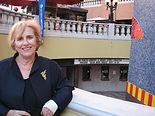- AWARD WINNING AUTHOR -
Joanne Oppenheim
DEAR MISS BREED
True Stories of the Japanese American Incarceration During World War II and a Librarian Who Made a Difference
Reviews of Dear Miss Breed
*STAR* Booklist “this passionately written history bears witness to …injustices endured by Japanese Americans… of particular relevance to young people.”
Horn Book “…compelling, as well as eerily timely… has not before been so fully told for young people and deserves wide reading and discussion.”
VOYA “…this engaging…history, demonstrating that a single person can, indeed make a significant difference in the lives of many. Memorable? Absolutely.”
Kirkus “…this is rich in primary material and also bears unmistakable relevance in this post-9/11 atmosphere.
Papertigers “…page-turning narrative (even endnote's are lively) minces no words…deeply moving chronicle …letters …interviews... testimony…are an integral part of this outstanding and inspiring work.
• Carter G. Woodson Award National Council for the Social Studies 2007
• NYPL Best for Teen Age List 2007


Of all the books I’ve written, I’m probably fondest of this one. I believe finding this story was no accident — but fate. In 2000, I visited the Japanese American National Museum website, hoping for help in finding a classmate, a Japanese American girl, whom we had lost contact with since 1949. While I was searching for a contact name, I read a story about a children’s librarian by the name of Clara Breed, who was upset when all of the Japanese American children in San Diego were forced to leave soon after WWII began. On the day of their departure they did not know where they were being sent, only that they were to report to the train station. Miss Breed had known many of them since they were small children—many of them were like family to her. On the day they left, Clara Breed went to the train station with a stack of self-addressed post cards telling her young friends to write to her so that she could send them whatever they needed. “Her children” as she called them, did write and Clara became their lifeline, sending them letters, books, candy, clothes and hope. Unknown to them, she kept over 200 letters that they write to her about their lives and hopes for the future.
By the time I found those letters, most of Miss Breed's children were in their 70s and more than a few were dead—as was their beloved librarian. With help from the museum, I was able to interview many of the correspondents and the stories they told of those times were often in sharp contrast to their letters that contained few complaints about the lives they were forced to lead inside of camps surrounded by guards with machine guns and fences of barbed wire. These young people were all American citizens who were held for three and a half years as prisoners of their own country.
By coincidence my friend, Ellen Yukawa, the girl I was looking for at the start had been a prisoner in the same camp in Arizona. Her story and theirs are intertwined in this book. Sadly, it’s a story that is as current as today’s news with those who champion camps and fear of immigrants. I was so fortunate that so many agreed to share their stories with me and have in fact become personal friends.
I have another website dedicated to stories about Dear Miss Breed and "her children" as she called them.

Thanks to the joint efforts of the San Diego Public Library and a grant from the California Civil Liberties Public Education Program, the Asian Story Theater staged Dear Miss Breed in my adaptation of the book. The scene on the right dramatized the long sad train ride that Japanese Americans from San Diego took from Santa Anita, where they were first imprisoned, to a prison camp in Poston, Arizona where most of them lived as prisoners for the next three and a half years.

